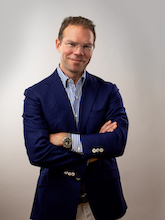
















On a bright November morning in Manhattan, several hundred luxury goods executives filed into the basement auditorium of the Morgan Library expecting to hear Paul Romer speak about China and innovation. Courtly, earnest and reserved, Romer is an academic economist by training, and it shows. Before the crowd’s caffeine could kick in, he offered a modest proposal: Rather than start the next Louis Vuitton, we should knock off Hong Kong. Cities can be startups too, he said. “We can build new ones much faster than people think.”
That’s what China’s paramount leader Deng Xiaoping thought in 1979 when he designated Shenzhen as the country’s first special economic zone. In less than 30 years, Romer explained, the fishing village across the border from Hong Kong had become a capitalist enclave larger and more populous than New York. Shenzhen, in turn, kicked off China’s transformation from a rural backwater to an export-driven powerhouse. Hong Kong and its copies, Romer likes to say, have done more to eliminate poverty than all the foreign aid put together, and he may be right. China lifted 660 million of its citizens out of absolute poverty between 1981 and 2008 – more than the rest of the world combined.
Romer’s appearance that morning was a favor to the hosts, his new colleagues at New York University’s Stern School of Business. A year ago, Stern lured the eminent economist back to academia with a $10 million gift for the Urbanization Project, a personal think tank devoted to creating new “charter” cities and massively expanding existing ones, thus planting the school’s flag in what dean Peter Henry believes will be a $20 trillion market in financing urbanization – and the next line of work for Stern graduates.
“We will do more urbanization in this century than we’ve done in all of history,” Romer said from the stage. “Whatever we do will establish the pattern that will last forever.” Expecting a day of social media tips and fireside chats with CEOs, the audience sat stunned – who decides that what the world needs now are mega-cities built from scratch in the its poorest places?
The rest of this story can be purchased at Next American City.

» Folllow me on Twitter.
» Email me.
» See upcoming events.

Greg Lindsay is a generalist, urbanist, futurist, and speaker. He is a non-resident senior fellow of the Arizona State University Threatcasting Lab, a non-resident senior fellow of MIT’s Future Urban Collectives Lab, and a non-resident senior fellow of the Atlantic Council’s Scowcroft Strategy Initiative. He was the founding chief communications officer of Climate Alpha and remains a senior advisor. Previously, he was an urban tech fellow at Cornell Tech’s Jacobs Institute, where he explored the implications of AI and augmented reality at urban scale.

----- | January 22, 2024
The Future of Generative AI in Architecture, Engineering, and Construction
----- | January 1, 2024
----- | August 3, 2023
CityLab | June 12, 2023
Augmented Reality Is Coming for Cities
CityLab | April 25, 2023
The Line Is Blurring Between Remote Workers and Tourists
CityLab | December 7, 2021
The Dark Side of 15-Minute Grocery Delivery
Fast Company | June 2021
Why the Great Lakes need to be the center of our climate strategy
Fast Company | March 2020
How to design a smart city that’s built on empowerment–not corporate surveillance
URBAN-X | December 2019
CityLab | December 10, 2018
The State of Play: Connected Mobility in San Francisco, Boston, and Detroit
Harvard Business Review | September 24, 2018
Why Companies Are Creating Their Own Coworking Spaces
CityLab | July 2018
The State of Play: Connected Mobility + U.S. Cities
Medium | May 1, 2017
Fast Company | January 19, 2017
The Collaboration Software That’s Rejuvenating The Young Global Leaders Of Davos
The Guardian | January 13, 2017
What If Uber Kills Public Transport Instead of Cars
Backchannel | January 4, 2017
The Office of the Future Is… an Office
New Cities Foundation | October 2016
Now Arriving: A Connected Mobility Roadmap for Public Transport
Inc. | October 2016
Why Every Business Should Start in a Co-Working Space
Popular Mechanics | May 11, 2016
Can the World’s Worst Traffic Problem Be Solved?
The New Republic | January/February 2016

January 31, 2024
Unfrozen: Domo Arigatou, “Mike 2.0”
January 22, 2024
The Future of Generative AI in Architecture, Engineering, and Construction
January 18, 2024
The Promise and Perils of the Augmented City
January 13, 2024